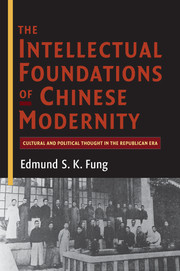 The Intellectual Foundations of Chinese Modernity
The Intellectual Foundations of Chinese Modernity Published online by Cambridge University Press: 03 May 2010
This study has examined three interrelated strands of thought in the Republican era, each a response to the ‘crisis of modernization’, and together, they formed the intellectual foundations of Chinese modernity. The non-Marxist elite in this study were a kind of mainstream intellectuals who were critical of laissez-faire economics, liberal capitalism and extreme individualism, being reformist and not that leftist on the whole. Many held liberal, conservative and socialist ideas simultaneously or at different times, ideas that represented different visions of modernity and yet were formed within a framework of common concepts of the age. Common concerns about the national crisis drove them to grapple with the same or similar questions concerning Chinese culture, state and society. As they interacted, they influenced one another in the discourse on modernity. By taking an integrated approach to exploring liberal, conservative and socialist thought, this study has revised the way we see the intellectuals whose ideas are sometimes far too nuanced to fit neatly under a particular banner.
Modernity is multilayered, internally complex and entails a criticism of modernity itself. It is from this perspective that this study has, first of all, probed the thought of the Westernizers and their critics in terms of cultural radicalism and cultural conservatism. The Westernizers identified themselves with Enlightenment modernity, influenced as they were by evolutionary theory and ideas of progress.
To save this book to your Kindle, first ensure no-reply@cambridge.org is added to your Approved Personal Document E-mail List under your Personal Document Settings on the Manage Your Content and Devices page of your Amazon account. Then enter the ‘name’ part of your Kindle email address below. Find out more about saving to your Kindle.
Note you can select to save to either the @free.kindle.com or @kindle.com variations. ‘@free.kindle.com’ emails are free but can only be saved to your device when it is connected to wi-fi. ‘@kindle.com’ emails can be delivered even when you are not connected to wi-fi, but note that service fees apply.
Find out more about the Kindle Personal Document Service.
To save content items to your account, please confirm that you agree to abide by our usage policies. If this is the first time you use this feature, you will be asked to authorise Cambridge Core to connect with your account. Find out more about saving content to Dropbox.
To save content items to your account, please confirm that you agree to abide by our usage policies. If this is the first time you use this feature, you will be asked to authorise Cambridge Core to connect with your account. Find out more about saving content to Google Drive.